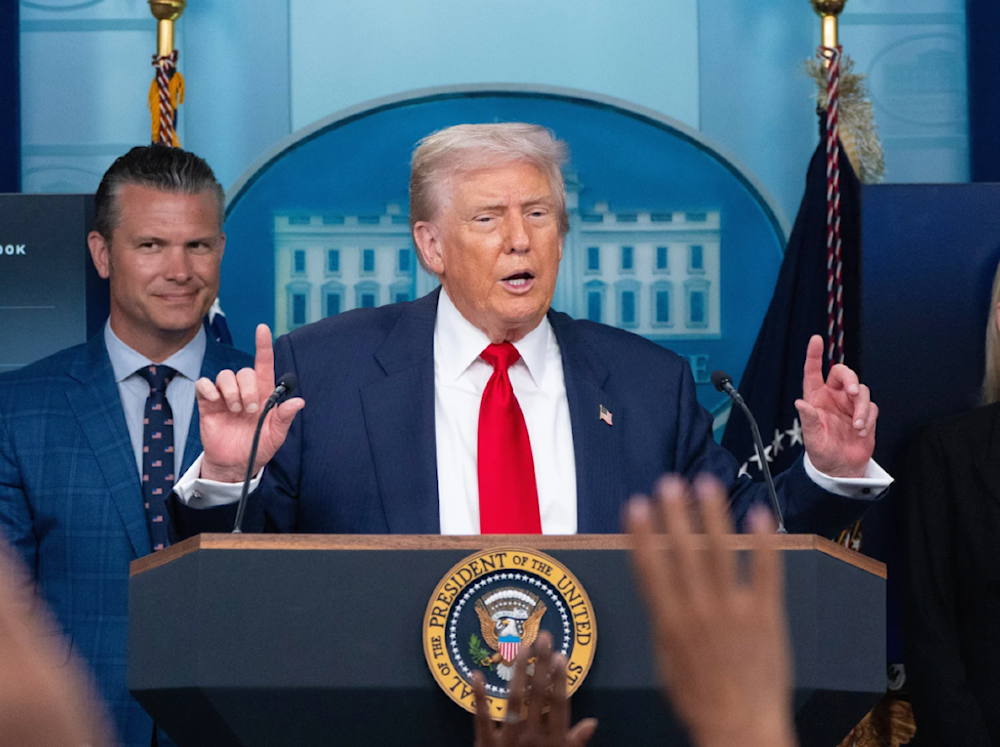Trump to bypass 1987 treaty, unlock Reaper-style drones global sales
Trump plans to reinterpret a 1987 missile treaty to allow the US to sell advanced attack drones abroad, starting with a potential deal for Saudi Arabia.
-

US President Donald Trump speaks with reporters in the James Brady Press Briefing Room at the White House on August 11, 2025, in Washington (AP)
US President Donald Trump is preparing to unilaterally reinterpret a decades-old arms control treaty to allow the United States to export advanced military drones, including MQ-9 Reapers, to foreign allies, Reuters reported, citing US officials and multiple sources familiar with the plan.
The move would circumvent restrictions under the 1987 Missile Technology Control Regime (MTCR) and pave the way for the sale of more than 100 MQ-9 drones to Saudi Arabia, potentially as part of a $142 billion arms package announced earlier this year.
Other US allies in the Pacific and Europe have also expressed interest.
Reclassifying drones as aircraft
Under the reinterpretation, drones would be designated as aircraft, comparable to fighter jets, such as the F-16, rather than as missile systems. This would sidestep MTCR restrictions, which subject drones capable of carrying heavy payloads over long distances to a “strong presumption of denial” for export, according to Reuters.
The MTCR, originally designed to curb the spread of long-range missiles, was later interpreted to include drones due to their ability to deliver weapons over large distances.
The policy change will allow manufacturers such as General Atomics, Kratos, and Anduril to treat drone exports as Foreign Military Sales, streamlining international sales processes.
Global competition, strategic concerns
US drone makers face stiff competition from rivals in "Israel", China, and Turkey, which have captured markets in the Middle East and beyond by offering drones under lighter restrictions. Neither China nor "Israel" is an MTCR signatory, while Turkey, despite being a signatory, has successfully marketed its Bayraktar-TB2 drones, particularly in Ukraine.
The United States has resisted sending large drones to Ukraine over concerns that advanced technology could fall into enemy hands. Meanwhile, Russia has deployed domestic and Iranian drones on the battlefield.
A US official said the new guidelines aim to ensure that Washington becomes “the premier drone provider instead of ceding that space to Turkey and China.”
Timing, market Impact
The reinterpretation is expected to be unveiled later this year as part of a broader review of the US Foreign Military Sales program. The timing will benefit companies developing next-generation jet-powered drones designed to operate as “wingmen” alongside piloted fighter aircraft, a rapidly growing market.
One of the first major sales under the new rules could be to Saudi Arabia. The Biden administration had restricted weapons sales to Riyadh in 2021, citing the kingdom’s use of US-made arms in its war on Yemen, which caused significant civilian casualties.
The White House is expected to promote the reinterpretation as part of Trump’s strategy to boost US manufacturing and reduce the trade deficit. Yet arms control advocates warn that easing restrictions risks fueling violence and instability in conflict zones such as the Middle East and South Asia.
All drone sales will still require State Department review, considering factors such as regional security dynamics, human rights, and the ability of recipient states to safeguard advanced weapons systems.

 3 Min Read
3 Min Read










